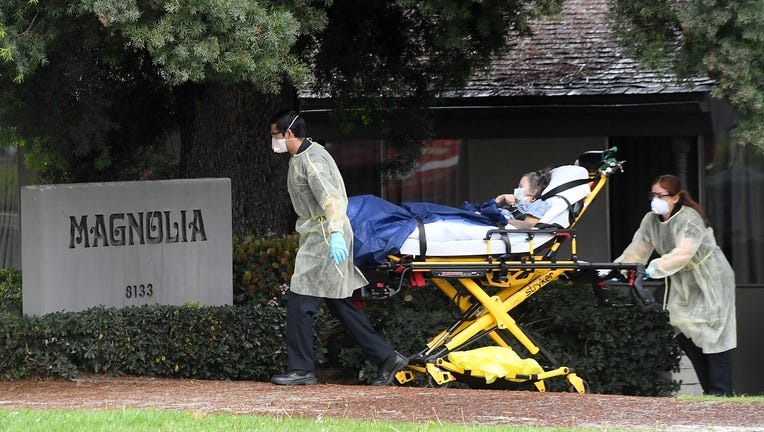Federal health officials planning to get coronavirus shots to nursing homes

RIVERSIDE, CA - APRIL 08: A patient at the Magnolia Rehabilitation and Nursing Center in Riverside is evacuated to a waiting ambulance Wednesday morning April 8, 2020. Employees of the facility, with 39 confirmed cases of the novel coronavirus, did n
WASHINGTON - Federal health officials have unveiled a plan to get yet-to-be-approved coronavirus vaccines to nursing home residents free of charge, enlisting two national pharmacy chains to help.
Such a vaccine is not yet available. The distribution program is contingent on the Food and Drug Administration authorizing a vaccine, which does not appear to be imminent. While one nursing home industry group endorsed the administration’s effort, another one was guarded in its reaction.
Under the voluntary program, trained staff from CVS and Walgreens would deliver the vaccines to each nursing home and administer shots. Assisted-living facilities and residential group homes can also participate. Nursing home staffers can be vaccinated, too, if they have not already received their shots. Needles, syringes and other necessary equipment will be included.
The idea, announced on Friday, is to give hard-pressed states an all-inclusive system for vaccinating their most vulnerable residents, said Paul Mango, a senior policy adviser at the Department of Health and Human Services. “We are trying to eliminate all potential barriers to getting folks safe and effective vaccines,” Mango said.
The nation has 15,000-16,000 nursing homes, according to the Centers for Disease Control and Prevention. There may be another 20,000-45,000 assisted living facilities and similar kinds of settings for elderly and disabled people.
COVID-19 patients moved to nursing home, 12 resident deaths reported
People in nursing homes and other long-term care facilities account for less than 1% of the U.S. population, but they represent about 40% of the deaths from COVID-19, with more than 83,600 fatalities logged by the COVID Tracking Project.
The Trump administration’s initial attempts to promote coronavirus testing in nursing homes and to ensure sufficient supplies of protective gear were hampered by missteps and led to widespread complaints from nursing home operators and advocates for older people. The vaccine program seems designed to get ahead of problems at a time when President Donald Trump is battling to hang on to support from older voters in his reelection campaign.
Earlier this month, the National Academies of Sciences, Engineering and Medicine recommended that the initial, limited doses of vaccine should go to first responders and high-risk health care workers. Those next in line should include older residents of nursing homes, the National Academies said, noting that who gets the shots will depend on age guidelines determined by the data on vaccine safety and efficacy.
There are many unanswered questions about the vaccines now undergoing clinical trials, including how well they will work to prevent infection. It’s also not known whether they will be equally protective for older adults. But COVID-19 vaccine studies are recruiting people over 65 and even into their 80s because it will be crucial to find out.
Nonetheless, the largest nursing home industry group applauded the administration’s action.
“We’re recommending that our members participate in this program, sign up and get everything ready to go,” said Dr. David Gifford, chief medical officer for the American Health Care Association. “Not to do that would be unfair to residents and staff.”
Planning now will save time, Gifford said.
A smaller group, representing nonprofit homes, was more reserved.
“It’s heartening to see that the administration’s planning has begun,” Katie Smith Sloan, president of LeadingAge, said in a statement. “The vaccine is still months away, so there is time to get this right.
“We look forward to learning more about how it will roll out.”
The vaccination plan for nursing homes has been set up under Operation Warp Speed, a White House-backed initiative to quickly produce and distribute hundreds of millions of doses of approved vaccines, enough for every American. The effort involves HHS and the Defense Department, as well as drugmakers and other private companies.
Mango said he anticipates that if a vaccine is approved this year, initial supplies will be limited. Availability will improve markedly in the first three months of 2021, he said.
HHS is asking nursing homes to sign up for the program, but the allocation of vaccines will be done through state and territorial governments.
Nursing homes and long-term care facilities will not be charged. CVS and Walgreens will be reimbursed at standard Medicare rates for administering the shots, officials said.
The use of retail chain pharmacies has prompted some concerns, because nursing homes typically deal with specialized pharmacies and not the big drugstores catering to consumers.
Michael Wasserman, a geriatrician and past president of the California Association of Long Term Care Medicine, said chain retail pharmacies “don’t necessarily have any clue what it takes to deliver pharmaceuticals to nursing homes. There are long-term care pharmacies that do this all the time.”
Mango said the plan would accommodate nursing homes that want to continue to work with specialized pharmacies.
HHS Secretary Alex Azar said the program will “provide convenient and free vaccination to residents of nursing homes across America.”

